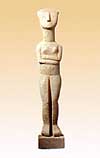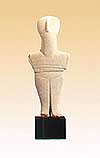The History of Ancient Greece

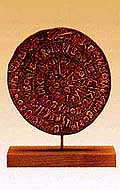 The
earliest inhabitants of Greece were Stone Age hunters. Farming began
in about 6000 BC. Archaeologists divide the earliest civilizations
into Helladic (mainland Greece), Cycladic (The Aegean islands) and
Minoan (Crete). Between 2200 and 1900 BC, people who appear to have
spoken an early form of Greek started arriving in Greece. A great
civilization grew up, which we name after the city of Mycenae, and
which lasted from about 1600 to 1100. The Trojan War took place
towards the end of this period.
The
earliest inhabitants of Greece were Stone Age hunters. Farming began
in about 6000 BC. Archaeologists divide the earliest civilizations
into Helladic (mainland Greece), Cycladic (The Aegean islands) and
Minoan (Crete). Between 2200 and 1900 BC, people who appear to have
spoken an early form of Greek started arriving in Greece. A great
civilization grew up, which we name after the city of Mycenae, and
which lasted from about 1600 to 1100. The Trojan War took place
towards the end of this period.
The Dark Ages
The period known as the Dark Ages began in about 1100 BC. Greece
was beset by troubles. The Mycenaeans lost control and a people,
called the Dorians, invaded from the north. During this period, the
poet Homer composed the Iliad and the Odyssey. In the 8th century BC,
the Greeks adopted a new, simple alphabet. The population increased
and some people emigrated and set up colonies around the
Mediterranean.
The Archaic Period
The Archaic Period was a time of political change. Kings had been
replacedin power by nobles, who set up oligarchies. In many states,
the oligarchies were then overthrown by tyrants, supported by the
people. In 594 BC, Solon, the ruler of Athens, granted a constitution
which marked the first step towards democracy.
The Classical Period
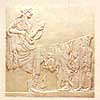
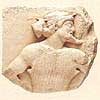 The Classical Period is the time when Athens was at the height of
its power. In 499 BC, the Greek cities in Asia Minor rebelled against
their persian rulers. Athens sent help, but the revolt failed and the
Persians declared war against Athens. The first Persian invasion
ended in their defeat at Marathon in 490 BC. In 480 BC, Sparta and
its allies fought the Persians at Thermopylae, but were defeated. In
the same year, the Athenians won a great naval victory over the
Persians at Salamis.
The Classical Period is the time when Athens was at the height of
its power. In 499 BC, the Greek cities in Asia Minor rebelled against
their persian rulers. Athens sent help, but the revolt failed and the
Persians declared war against Athens. The first Persian invasion
ended in their defeat at Marathon in 490 BC. In 480 BC, Sparta and
its allies fought the Persians at Thermopylae, but were defeated. In
the same year, the Athenians won a great naval victory over the
Persians at Salamis. 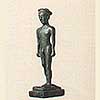
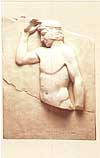 The wars came to an end in 479 BC, when the Persians were beaten
at Plataea. In Athens, thee followed a golden age in the arts and
learning. Many of the finestsculptures and painted pots were produced
during this period. Athens formed the Delian League with other Greek
States and dominated Greece politically. In 432 BC the building of
Parthenon was completed. Between about 460 and 430 BC, Athenian
politics were influenced by the brilliant and popular politician,
Pericles. The Peloponnesian Wars were fought between Athens and
Sparta from 431 to 404 BC. Athens was defeated and the Spartans
installed their own goverment, though democracy was soon restored.
The wars came to an end in 479 BC, when the Persians were beaten
at Plataea. In Athens, thee followed a golden age in the arts and
learning. Many of the finestsculptures and painted pots were produced
during this period. Athens formed the Delian League with other Greek
States and dominated Greece politically. In 432 BC the building of
Parthenon was completed. Between about 460 and 430 BC, Athenian
politics were influenced by the brilliant and popular politician,
Pericles. The Peloponnesian Wars were fought between Athens and
Sparta from 431 to 404 BC. Athens was defeated and the Spartans
installed their own goverment, though democracy was soon restored.
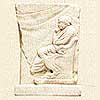
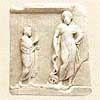 The philosopher, Socrates, was forced to commit suicide in 399 BC
by those seeking to blame someone for the misfortunes of Athens.
Peace did not return to Greece. In 371 BC, the Thebans defeated the
Spartans. Meanwhile, the power of King Philip of Macedon was growing.
He fought many battles and eventually united Greece under his
rule.
The philosopher, Socrates, was forced to commit suicide in 399 BC
by those seeking to blame someone for the misfortunes of Athens.
Peace did not return to Greece. In 371 BC, the Thebans defeated the
Spartans. Meanwhile, the power of King Philip of Macedon was growing.
He fought many battles and eventually united Greece under his
rule.
The Hellenistic Period
In 336 BC, Philipwas assasinated and succeeded by his son,
Alexander the Graet (336-323 BC). Alexander conquered a vast empire,
stretching from Egypt to India. In 331 BC, the city of Alexandria was
founded in Egypt and it became a centre of learning. After
Alexander's death, his generals fought each other and divided the
empire between them. By this time, the Romans were beginning to
acquire their own empire. First they took over the Greek colonies in
Italy, then moved into Greece itself. Many Greeks were taken to Italy
as slaves, and by 146 BC, Greece had become a Roman province.

 The
earliest inhabitants of Greece were Stone Age hunters. Farming began
in about 6000 BC. Archaeologists divide the earliest civilizations
into Helladic (mainland Greece), Cycladic (The Aegean islands) and
Minoan (Crete). Between 2200 and 1900 BC, people who appear to have
spoken an early form of Greek started arriving in Greece. A great
civilization grew up, which we name after the city of Mycenae, and
which lasted from about 1600 to 1100. The Trojan War took place
towards the end of this period.
The
earliest inhabitants of Greece were Stone Age hunters. Farming began
in about 6000 BC. Archaeologists divide the earliest civilizations
into Helladic (mainland Greece), Cycladic (The Aegean islands) and
Minoan (Crete). Between 2200 and 1900 BC, people who appear to have
spoken an early form of Greek started arriving in Greece. A great
civilization grew up, which we name after the city of Mycenae, and
which lasted from about 1600 to 1100. The Trojan War took place
towards the end of this period.